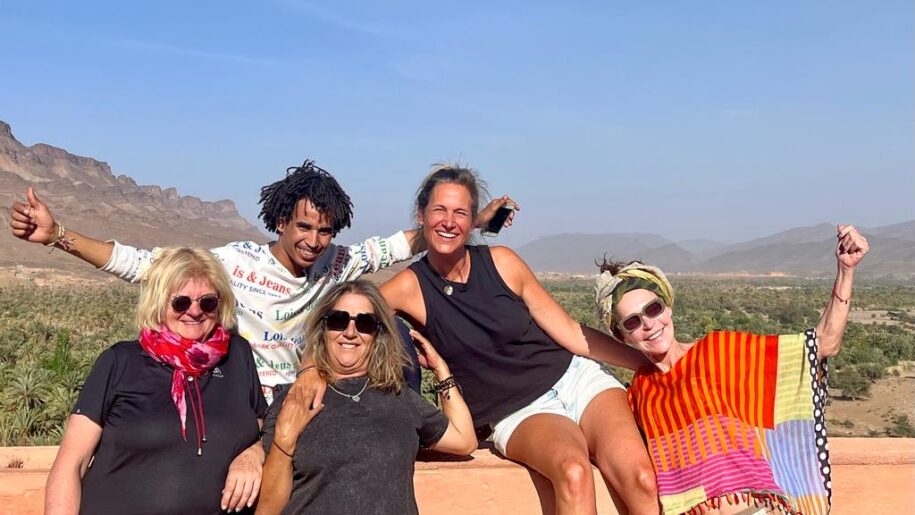Is Morocco friendly to tourists A Guide to Tourist-Friendly Morocco
Morocco Introduction
Located at the crossroads of Africa and Europe, Morocco is a captivating blend of vibrant cultures, breathtaking landscapes and rich history. For travellers seeking an immersive experience in a country that welcomes visitors warmly, Morocco is an enticing destination. But is Morocco really tourist-friendly? In this blog post, we’ll explore the hospitality that awaits travellers in this North African gem.
Moroccan hospitality: A cultural treasure
Hospitality is deeply rooted in Moroccan culture. Welcoming guests is an integral part of the social fabric, and visitors are often greeted with genuine warmth and a friendly demeanour. The traditional Arabic saying “Dakhl Allah, khellik m3ana” translates as “When you enter, you become part of us”. The saying encapsulates the inclusive nature of Moroccan hospitality, where visitors are treated as honoured guests.
Warm interactions in local markets
Exploring the bustling markets (souks) of Morocco is an experience in itself. As you navigate the labyrinthine alleyways, you’ll meet friendly shopkeepers eager to show off their handicrafts, spices, textiles and more. Engaging in light-hearted banter, haggling and even sipping mint tea offered by the shopkeepers are all part of the delightful shopping experience. Don’t be surprised if conversations lead to insights into local life, recommendations for hidden gems or invitations to join in local festivities.
Accommodation: More than just a place to stay
Morocco offers a wide range of accommodation options, from luxury riads to budget hostels. What sets Moroccan accommodation apart is the attention to detail and the sense of community it fosters. Riads, traditional Moroccan houses with courtyards, offer an intimate setting where guests are often treated like family. Many hosts go above and beyond to make your stay memorable, offering insights into local customs, recommending off-the-beaten-track attractions and sharing stories that give an insight into Moroccan life.
Navigating the streets and beyond
Navigating the streets of Moroccan cities can be an adventure in itself, with the medinas (old quarters) offering a labyrinthine network of narrow alleyways. Don’t hesitate to ask locals for directions; they are usually more than happy to help you find your way. Interacting with locals is a wonderful way to learn about their lives, share travel experiences and gain a deeper understanding of Moroccan culture.
Culinary experiences and shared meals
Moroccan cuisine is renowned for its vibrant flavours and diverse influences. Don’t miss the opportunity to sample traditional dishes such as tagine, couscous and harira soup. Beyond the food itself, eating in Morocco is often a communal experience. From street food stalls to fine dining, you’ll find that sharing meals is a cherished tradition. This provides an opportunity to bond with locals over a shared love of food and conversation.
Cultural sensitivity and respect
While Moroccan hospitality is generally warm and open, it’s important for travellers to be culturally sensitive and respectful of local customs and traditions. Dress modestly, especially when visiting religious sites, and ask permission before taking photographs of people. Learning a few basic Arabic phrases such as “hello” (salam) and “thank you” (shukran) can go a long way towards fostering positive interactions.
Hospitality in the Sahara: Nomadic traditions
A trip to the Sahara is an unforgettable experience, not only for the breathtaking landscapes but also for the encounter with nomadic hospitality. The Berber nomads have crossed these sands for generations and extend their generosity to those who venture into their kingdom. Visitors may have the opportunity to share tea with nomadic families, listen to their stories of desert life and even spend a night under the vast desert sky, wrapped in the warmth of their traditional hospitality.
Festivals and celebrations
Is Morocco friendly to tourists
Morocco’s calendar is dotted with a myriad of festivals and celebrations that showcase the country’s cultural richness. From the lively atmosphere of the Marrakech Popular Arts Festival to the vibrant Gnaoua World Music Festival in Essaouira, these events offer an opportunity to immerse yourself in Moroccan music, dance and art. Attending such festivals opens the door to spontaneous interactions with locals eager to share their cultural heritage.
Overcoming language barriers
One concern travellers may have when visiting Morocco is the language barrier. While Arabic is the official language, French is widely spoken, especially in urban areas and tourist destinations. English is also widely used in the hospitality industry. While basic language skills can be helpful, don’t be put off by language barriers. Moroccans are often adept at using gestures, expressions and even drawings to communicate, making interactions all the more memorable.
Safety and wellbeing
As with any destination, safety is a concern for travellers. Morocco is generally considered a safe country for tourists, but it’s wise to take common sense precautions. Keep an eye on your belongings, especially in crowded places, and be wary of scams. It’s a good idea to dress modestly, especially in more conservative areas, to show respect for local customs and to avoid attracting unwanted attention.
Is Morocco friendly to tourists
In conclusion: An invitation awaits
From the medinas and souks to the golden dunes of the Sahara, Morocco invites travellers to experience its warmth, hospitality and rich cultural tapestry. The country’s friendly locals, shared meals, vibrant markets and immersive traditions create an environment where visitors can truly connect with the heart of Morocco. While it’s always important to travel with respect and an open mind, Morocco’s reputation as a tourist-friendly destination is well deserved, making it a must-visit for those seeking an authentic and enriching travel experience. So pack your bags, embrace the spirit of adventure and get ready to embark on a journey that promises to be both memorable and transformative.


Leave a Reply